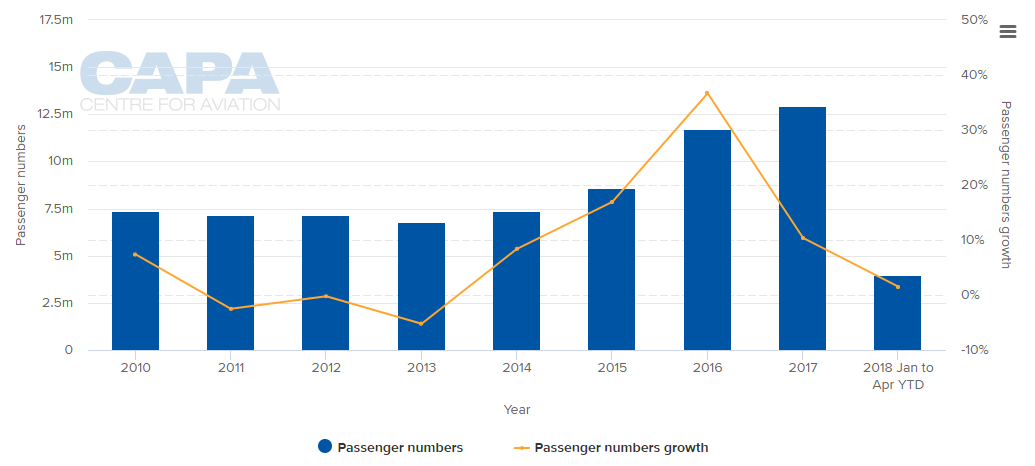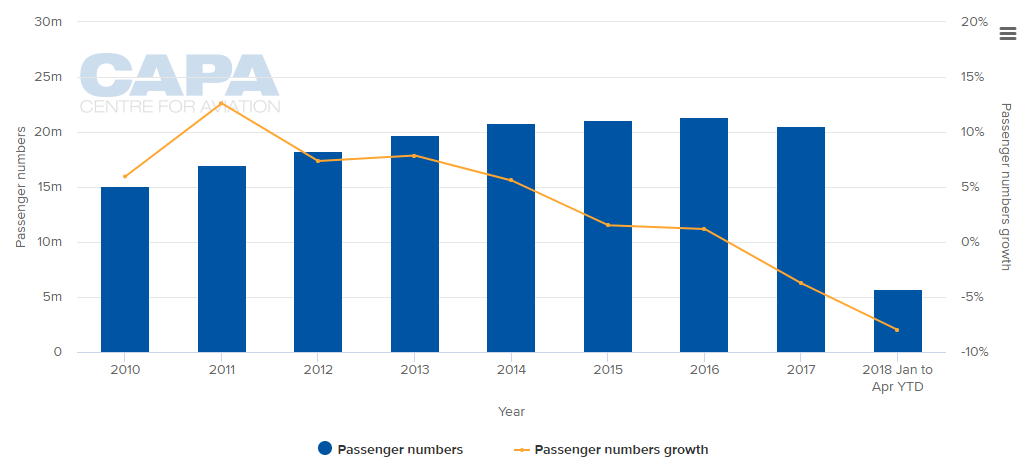Summary:
- New report into the long-delayed Berlin Brandenburg Airport project discovers 863 technical deficiencies and says "operational safety and effectiveness cannot conclusively be certified" in the proposed new terminal building;
- The findings suggest even further delays to the project and could see the latest 2020 opening date projection pushed further out to the right;
- As things stand the new airport is scheduled to be open and operational in Oct-2020, only nine years late, and the main building may be functional before then;
- The cost of the project continues to mount as well. In Mar-2018 Flughafen Berlin Brandenburg GmbH's supervisory board estimated a total investment to EUR7.3 billion, over three and a half times the original project estimate.
The report stated "operational safety and effectiveness cannot conclusively be certified", suggesting deficiencies could lead to delays of up to 11 months with a 50% chance of further delays. Flughafen Berlin Brandenburg GmbH advisory board spokesperson Hannes Stefan Hönemann confirmed the report, noting countermeasures have been implemented since the report was released.
There is a real concern here, as the TÜVs are not Government organisations and therefore cannot be accused of having any prejudices such as too-great-a- focus on safety. They are businesses, employing tens of thousands of people, which provide inspection and certification services to industry, governments, individuals, and non-profit groups. Indeed TÜV Rheinland has annual revenues in the order of EUR2 billion, with more than half of it generated outside Germany. They don't always get it right. In 2013 TÜV Rheinland was held liable by a French court to 1600 women whose breast implants had ruptured; it had certified the manufacturing process.
That suggests that caution may well be the watchword now but assuming that all these identified technical deficiencies are accurate does this anticipated 11-month delay (and possibly more) have to be added to the existing one? As things stand the airport is scheduled to be open and operational in Oct-2020, only nine years late, and the main building may be functional before then. But the terminal safety technology was supposed to be in place by Feb-2018, three months ago, and it is operational safety that is being questioned. The installation of a safety control system by another company is said to be dependent on the functionality of the first system.
https://corporatetravelcommunity.com/spiele-ohne-grenzen-the-shambles-that-is-the-berlin-airport-system/
In the worst-case scenario this would point to an opening date in 2021 or even later rather than 2020. Aeroplanes could be obsolete before it is ready to receive them. Moreover, Flughafen Berlin Brandenburg could be accused of getting ahead of itself as only this month it announced plans to award a contract for the construction of a new terminal at BER in summer 2018. This new EUR100 million T1E terminal aims to increase capacity by six million passengers per annum.
The reason for the capacity increase is that it became evident that BER would open with insufficient capacity of only 27 million passengers annually, while Tegel Airport would close, which it has to do by law (though that law has been disputed and a city referendum voted in favour of keeping it open), leaving Berlin in as precarious a position as it was previously.
But there will be little confidence in Flughafen Berlin's capability to build another new terminal while it cannot get the first one right as evidenced by TÜV Rheinland's reports. There is no option to open the airport with only this second terminal while its capacity remains at six million ppa.
CHART - Ironically, what had been strong passenger growth at both the existing airports, Schönefeld (top) and Tegel (bottom), has bottomed out dramatically and even headed well into negative territory at Tegel Airport following the collapse of airberlin, perhaps throwing another spanner in the works
 Source: CAPA - Centre for Aviation and Flughafen Berlin Brandenburg
Source: CAPA - Centre for Aviation and Flughafen Berlin Brandenburg
The cost of all this continues to mount as well. In Mar-2018 Flughafen Berlin Brandenburg GmbH's supervisory board presented its business plan for the years 2018 to 2037. The company identified additional funding requirements of EUR770 million/USD956 million for the period after the opening of BER (in Oct-2020), due to a loss of revenue from the unfinished main terminal. This brings the total investment to EUR7.3 billion/USD9 billion, over three and a half times the original project estimate, and before any further expense arising from the TÜV Rheinland report.
The new plan takes into account the expectation of an increase in revenues based on the increase in passenger numbers from 2021 and improved revenue opportunities in non-aeronautical activities. The board discussed different options for covering financial needs, including a hire purchase model at the expense of long term revenue. FBB also aims to raise EUR400 million of necessary funds on the capital market.
The private sector began this project before the public one took it over following a dispute. There is no sign yet that the private sector is going to get another look-in. Berlin is a city that has always been noted for its wild nightlife. When BER eventually opens there is going to be Die Mutter of all parties. Assuming, that is, there's enough lefty in the kitty to pay for it.
An extended report on Schönefeld Airport and its relationship with BBI was published by CAPA in Jun-2017: Berlin Schoenefeld Airport: dramatic passenger growth figures and it may have an extended shelf life.